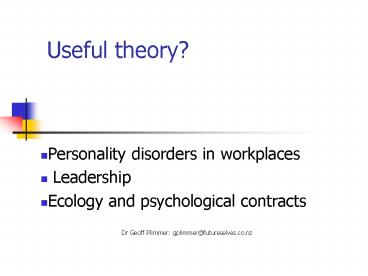Useful theory? - PowerPoint PPT Presentation
1 / 14
Title: Useful theory?
1
Useful theory?
- Personality disorders in workplaces
- Leadership
- Ecology and psychological contracts
- Dr Geoff Plimmer gplimmer_at_futureselves.co.nz
2
Personality common disorders in the workplace
- No hits on psycinfo
- Commonly spoken of, identified by practitioners
- 1 women, 3 men
- Emerged as legal defence against plaintiffs in US
3
Some (relatively) common types (McDonald 2002)
- Anti-social rule violations, disciplinary
action, physically violent - Borderline Plays victim, inappropriate sexual
behaviour, emotionally volatile - Narcissistic perceived personal slights, self
centred, insensitive to subordinate needs
4
Narcissistic personality disorder (Dattner, 2002)
- Benefits Often driven, charismatic, visionaries
- Risks
- Emotionally volatile, can be exploitive, can
ignore or deny reality to maintain self esteem,
can create splits in organisations through strong
loyalty to ingroup, opposition to outgroup
5
Leadership
- Epitropaki Martin 2004 Implicit leadership
theories say - Research traditionally focussed on leadership
effectiveness and leader traits - Staff perceptions, cognitions, relatively ignored
- Assumes people match leaders against prototypes
(good) and antiprototypes (bad)
6
How staff use them
- They represent schema
- Foundation for interpreting leader behaviouir
- Guide for their own behaviour
- Associated with transformational leadership (Bass
Avolio, 1989) - Tend to be stable and hard to change
dialectical process in response to new
information or experience
7
Schema
- Totalitarian ego generally positive and self
reinforcing - Look for confirming information
- Overlook disconfirming information
- Generally discredit sources of negative
information
8
Dimensions of implicit leadership
- Prototypes
- Sensitivity understanding, sincere, helpful
- Intelligent Intelligent, knowledgeable,
educated, clever - Dedication Dedicated, motivated, hardworking
- Dynamism Dynamic, energetic, strong
9
Antiprotypes
- Tyranny Domineering, pushy, manipulative, loud,
conceited, selfish - Masculinity Male, masculine
- Those in management jobs rate strong
energetic/dynamic as more important - Males rate anti-prototypes higher
- Women rate sensitivity higher
10
Masculine (M) traits and leader effectiveness
- Positively associated with leader emergence (Kent
Moss 1994) - Negatively associated with leadership (Gurmann
Long, 1992) - Both (M F) related to transformational
leadership (Hackman, Furniss, Hills Patterson,
1992) - F related to transformational (Offerman,1997)
- M may predict leader emergence, but not
necessarily provide developmental and
constructive form of leadership
11
How useful?
- Training
- Induction
- Feedback and performance management
12
Organisational ecologies (Colarelli, 1998)
- Evolutionary perspective
- People have overt and covert agendas
- Managers have limited information processing
ability - The competency model is based on
- Command and control
- Stable tasks
- Fitting people to jobs, not jobs to people
- But people have varying strengths and weaknesses,
and configure jobs in their own way
13
The psychological contract
- an individuals belief in mutual obligations
between that person and another party, such as an
employer (Rousseau, 1989) - Some types
- Transactional short term, based on economic
exchange. - Transitional cognitive statement about
organisational change often characterised by
mistrust, uncertainty and erosion
14
Types of contract
- Relational long term/open ended. Based on trust
and loyalty. Few reward conditions. Stability,
loyalty. - Balanced dynamic and open ended conditioned
on organisational success both parties
contribute to each others learning and
development. Individual and organisation based
performance based contingencies. External
employability, internal advancement































